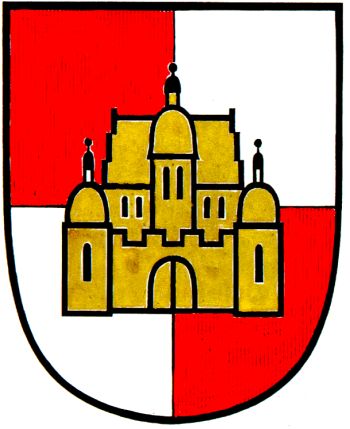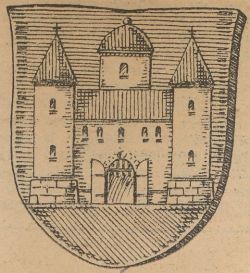Castell: Difference between revisions
Jump to navigation
Jump to search
Knorrepoes (talk | contribs) |
Knorrepoes (talk | contribs) No edit summary |
||
| Line 17: | Line 17: | ||
The arms are based on the village seal known from the 17th century. The village developed around a castle of the Lords of Castell, since 1205 Counts of Castell. The red and silver quartering is taken from their arms, whereas the castle is both a canting element as a symbol for the local castle and history. | The arms are based on the village seal known from the 17th century. The village developed around a castle of the Lords of Castell, since 1205 Counts of Castell. The red and silver quartering is taken from their arms, whereas the castle is both a canting element as a symbol for the local castle and history. | ||
Before 1964 the municipality only used a castle: | Before 1964 the municipality only used a castle (image from 1956): | ||
[[File:Castell1.jpg|center|250 px|Wappen von {{PAGENAME}}]] | |||
{{media}} | {{media}} | ||
Revision as of 13:59, 27 January 2022
This page is part of the German heraldry portal Deutsche Wappensammlung |
Heraldry of the World |
|
German heraldry:
|
Selected collector's items from Germany:
|
CASTELL
State : Bayern
District (Kreis) : Kitzingen
Additions : 1977 Greuth, Wüstenfelden
Official blazon
Geviert von Rot und Silber, aufgelegt eine goldene Burg.
Origin/meaning
The arms were officially granted on November 17, 1964.
The arms are based on the village seal known from the 17th century. The village developed around a castle of the Lords of Castell, since 1205 Counts of Castell. The red and silver quartering is taken from their arms, whereas the castle is both a canting element as a symbol for the local castle and history.
Before 1964 the municipality only used a castle (image from 1956):
Contact and Support
Partners:
Your logo here ?
Contact us
© since 1995, Heraldry of the World, Ralf Hartemink 
Index of the site













